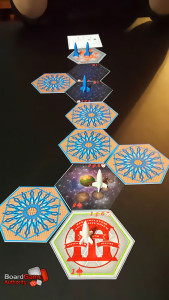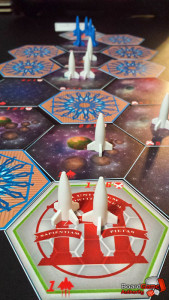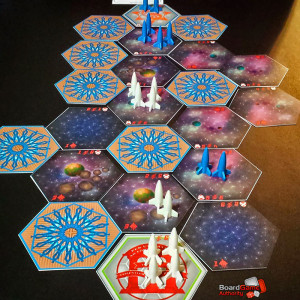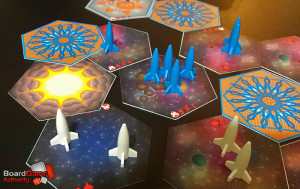 I first played Unbound: Endless War over two years ago. At the time, I was playing a lot of prototypes and Unbound really stood out. Most of the other prototype board games that I was being sent had obvious flaws; it was clear that they needed a lot of work before they were shelf-ready. Unbound: Endless War was different though, it was clear that a lot of time, effort, sweat, love, tears, and countless playtests had gone into creating the game.
I first played Unbound: Endless War over two years ago. At the time, I was playing a lot of prototypes and Unbound really stood out. Most of the other prototype board games that I was being sent had obvious flaws; it was clear that they needed a lot of work before they were shelf-ready. Unbound: Endless War was different though, it was clear that a lot of time, effort, sweat, love, tears, and countless playtests had gone into creating the game.
A tile-laying game of space combat, Unbound offers engaging gameplay with lots of strategic choice. To set up the game, place the two bases exactly five hexes apart from one another and give each player five random hex tiles. To win, you’ll need to occupy your opponent’s base for an entire turn. On your turn, you’ll draw three hex tiles and then take as many actions as you are able. Actions include placing a hex tile, spawning ships, moving ships, and removing occupied tiles. Most actions require a set number of tiles to be discarded from your hand before performing the action. For example spawning a ship requires you to discard one hex tile while removing an occupied hex requires three tiles to be discarded.
Hex tiles must be placed in a way that forms an unbroken connection to your base. This means that you can’t place new hex tiles on the far side of enemy units. The hexes are placed face down, signifying unexplored space territory. Each hex has three stats: Defense, Attack, and  Movement Cost.
Movement Cost.
Movement cost is how many movement points it costs to move off one hex and onto another. Discarding one hex tile from your hand gives two movement points. Strategically placing hex tiles with high movement cost is a good way to keep your opponent at bay and make them burn through their hand of tiles.
The attack and defense values on the tiles come into play during combat. Whenever opposing ships want to move into the same space, combat occurs. The total attack value is determined by multiplying the number of ships by the attack value of the hex they are moving from. The defense value is found my multiplying the number of ships by the defense value of the defending hex, the hex the attacker wants to move onto. Whichever side has the higher value is the winner. If the attacker wins, they move the number of attacking ships onto the space, which forces all of the defender’s ships to go to the defender’s reserve. Ships from multiple hexes can attack the same opponent-controlled hex. For example: in a cluster of three hexes, two controlled by Player A and one controlled by Player B, Player A could attack the hex controlled by Player B with all of their ships (four from one tile and one from the other) providing they have enough movement.
 There is a lot of strategy in laying the tiles as well as moving/placing your ships. Spawning ships to create a line of defense will help keep your opponent away from your base. Also, discarding occupied tiles is a fun way to remove a direct route to your base. In the games I played there was a lot of back and forth, and due to the strategic nature, Unbound: Endless War invoked a feeling reminiscent of a good chess match.
There is a lot of strategy in laying the tiles as well as moving/placing your ships. Spawning ships to create a line of defense will help keep your opponent away from your base. Also, discarding occupied tiles is a fun way to remove a direct route to your base. In the games I played there was a lot of back and forth, and due to the strategic nature, Unbound: Endless War invoked a feeling reminiscent of a good chess match.
There are two types of special tiles in Unbound. One is a black hole and the other is a supernova. Both are fun to play and discover. Ships that encounter a black hole cannot move off of the hex. Instead, one by one (one per turn) they are sent to the controlling player’s reserve. A supernova, on the other hand, explodes and removes all of the surrounding hex tiles (and ships on those hexes) from play. Supernovas can really wreck havoc on well intended plans.
The hidden information aspect of Unbound is a really fun part of the game. I’m laying tiles to hopefully sabotage my opponent and they are doing the same to me. But hopefully, if I’ve done everything right, I’ve left a path for  my own ships to get through. And then there’s also the strategy of where to place the high defense and high attack tiles. All in all, Unbound: Endless War is a solid two play strategy game.
my own ships to get through. And then there’s also the strategy of where to place the high defense and high attack tiles. All in all, Unbound: Endless War is a solid two play strategy game.
If you are a fan of two player strategy games, especially those with a combat mechanic, definitely check out Unbound: Endless War on Kickstarter.


Thanks for the write up and the praise!